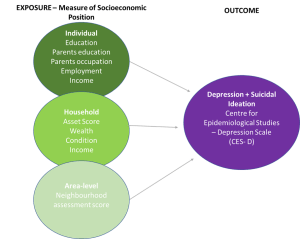 In this blog, Lucy Barrass talks about her plans for her PhD which is using data from the Philippines to improve our knowledge of what contributes to poor mental health in this country, focusing on socioeconomic position. Lucy also reflects on her experiences as a new PhD student at Bristol University.
In this blog, Lucy Barrass talks about her plans for her PhD which is using data from the Philippines to improve our knowledge of what contributes to poor mental health in this country, focusing on socioeconomic position. Lucy also reflects on her experiences as a new PhD student at Bristol University.
Mental health research is severely lacking in low and middle income countries (LMICs). The burden of disease is high, but the evidence surrounding it is low. Evidence in high income countries (HIC) may not be generalizable to LMICs due to differences in cultural and societal exposures. Studies from LMICs are mainly performed at one time point or they collect data retrospectively, making it difficult to determine if the exposure came before the outcome; very little evidence is from birth cohort data that can be used to explore causality and early life exposures. A life course approach allows early life exposures to be analysed in synergy with later life exposures.
I’m Lucy Barrass and I am a first year PhD student at Bristol. I previously studied and worked at Newcastle University before I moved to Bristol to pursue this PhD, motivated by an opportunity to improve public health, and develop skills in global health and epidemiology. As part of a GW4 PhD I plan to use data from a unique dataset in the Philippines to improve our knowledge of what contributes to poor mental health in this country. I will use data from the Cebu Longitudinal Health and Nutrition Survey (CLHNS), a birth cohort situated in a metropolitan area in the Philippines. The CLHNS was first conducted in 1983, collecting data about pregnant women and their new-born children. The study has collected data between the ages of 0 to 35, allowing for a comprehensive longitudinal analysis exploring early and later life exposures. This PhD will use the CLHNS to provide support of the associations between socioeconomic position and mental health in a LMIC. The study aims to identify socioeconomic risk factors for depression and suicidal thoughts, that are contextually relevant and can be used as measures to design interventions. Despite the existence of the CLHNS, there is very little evidence on mental health in the Philippines, particularly on risk factors across the life course and exploring socioeconomic position.
The below image shows some variables which will be used in my analysis, that are present in, or can be constructed from, the CHLNS.
I am still considering comparing the results from the Filipino data to other birth cohorts that measure depression/suicidal thoughts in other LMICs, such as the Birth to Twenty in South Africa. It may provide an added dimension to the results and potentially highlight differences that occur between different populations.
Having been a PhD student for a few months now, I am starting to settle into PhD life and can begin to think about goals and things I hope to achieve whilst I complete it. So far, I am really enjoying it, and I’m looking forward to progressing as a researcher in the coming months and years! I am particularly excited to learn new statistical methods to explore the longitudinal data as I haven’t previously used this type of data and I think this will be really beneficial for my career. Equally, hopefully being able to present my work at international conferences will be something I would love to work towards. I am also excited to be given the opportunity to visit the Philippines to further understand the dataset, both methodologically and culturally and ensure my findings are utilised. If you are interested in hearing more about my PhD, please do get in contact with me!

